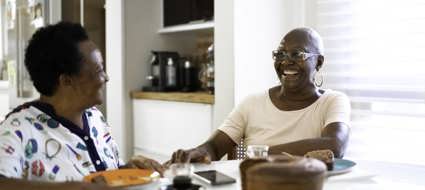Reflect on how your practice can be inclusive and responsive to the needs and wishes of transgender (trans) people in later life.
An integral part of social care practice is the protection and promotion of the rights of people with care and support needs and ensuring that people are not excluded or discriminated against. A new Practice Tool is designed to encourage practitioners to start thinking about supporting older trans people who may draw on services related to ageing and social care. Aimed at helping improve knowledge and confidence for practice, it includes an overview of terminology, top tips for developing skills for providing care and support for older trans people, and reflective tools.
Resources to support inclusive, rights-based and person-centred care

Research in Practice provides learning materials to support professionals working with people accessing services. The following learning aims to enable inclusive, rights-based and person-centred care in relation to working with older transgender people.
This Evidence Review chapter provides an overview of the diversifying and emergent needs of a new generation of older people in relation to sex, intimacy and relationships, and the significance of these in later life. It explores the role of adult social care in supporting and enabling relationships among older adults in receipt of services, as well as the implications for practice. Key issues relating to the intersections of gender identity, sexuality, race, ethnicity and culture are explored.
Assessment for care and support is underpinned by human rights ethics, law and practice. This resource aims to enable practitioners in adult social care to use evidence-informed approaches to uphold human rights in and through assessment. It uses the case study of the impact of Covid-19 to reflect on the importance of a human rights approach and considers how to seek support and transfer learning into practice.
The changing demographics in the UK are leading to more diverse older populations, with a more complex range of health and social care issues for adult social care to respond to. These videos highlight tasks and strategies to enable practitioners to apply intersectional approaches. Intersectionality is a tool for analysing how different forms of oppression (ageism, racism, sexism, ableism, heterosexism, classism) interact and intersect to influence lived experiences.
Strengths-based working focuses on people's strengths, including their knowledge, skills and capabilities. Explore a range of learning materials that supports work to enable and empower individuals.
An integral part of social care practice is the protection and promotion of the rights of people with care and support needs and ensuring that people are not excluded or discriminated against. This tool is designed to encourage practitioners to start thinking about supporting older trans people who may draw on services related to ageing and social care.




